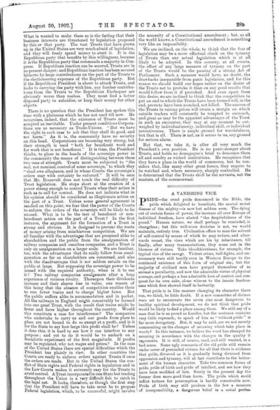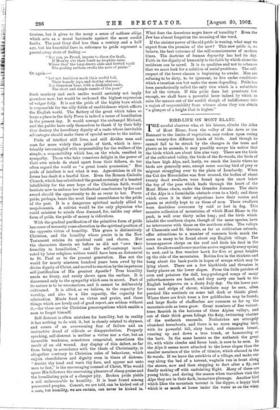A VANISHING VICE.
PRIDE—the cruel pride denounced in the Bible, the pride which delighted to humiliate, the mortal moral disease of the mighty—is now but seldom seen. The dying out of certain forms of power, the increase all over Europe of individual freedom, have abated "the despitefulness of the proud." Human nature, we shall perhaps be reminded, is changeless ; but this well-worn doctrine is not, we would maintain, entirely true. Civilisation offers to man the solvent of self-control by means of which be may reduce, and after- wards recast, the vices which are his by inheritance, till finally, after many transmutations, they come out in the likeness of virtues. Take bloodthirstiness, for example, the typical vice of the savage. Violent crime, bull-fights, and un- necessary wars still testify even in Western Europe to the continued existence of this form of original sin; but the majority of civilised men have purged themselves of so animal a peculiarity, and now the admirable virtue of physical courage, and perhaps a less admirable love of contest and con- quest for its own sake, alone witness to the innate fearless- ness which first showed itself in barbarity.
That pride is in like manner changing its character there can, we think, be little doubt. If a new committee of divines were set to enumerate the seven sins most dangerous to healthy spiritual development, we do not think that pride would be likely to find a place among them. We still say of a man that he is as proud as Lucifer, but the sentence contains very little reproach; to speak of him as " without pride " is far more derogatory. But, it may be said, are we not merely commenting on the changes of meaning which take place in words ? In this instance, we believe the word has changed its meaning in accordance with the changes in the quality it represents. It is still, of course, used, and still wanted, in a bad sense. Some ugly remnants of the old pride still remain under cover of pretended virtues, for all that there is evidenee that pride, divorced as it is gradually being divorced from oppression and tyranny, will at last contribute to the better- ment of the human character. Take two common forms of pride, pride of birth and pride of intellect, and see how they have been modified of late. Surely in the present day the former does more good than harm. The pride which could inflict torture for presumption is hardly conceivable now. Pride of birth may still produce in the few a measure of irresponsibility, a dangerous belief in a social perfect tionism, but it gives to the many a sense of noblesse oblige which acts as a moral barricade against the more sordid
faults. The poet Gray died less than a century and a half ago, but his beautiful lines in reference to pride represent a passed-away state of feeling :—
" Nor you, ye Proud, impute to these the fault, If Mem'ry o'er their tomb no trophies raise,
Where thro' the long-drawn aisle and fretted vault The pealing anthem swells the note of praise."
Or again:—
"Let not Ambition mock their useful toil,
Their homely joys, and destiny obscure ; Nor Grandeur hear, with a disdainful smile, The short and simple a,nnals of the poor."
Such mockery and such smiles would certainly not imply grandeur now, but would be reckoned the highest expression
of vulgar folly. It is not the pride of the highly born which is responsible for the silly foible of snobbishness which afflicts
the English world. The flattery of the great which takes so large a place in the daily Press is indeed a cause of humiliation in the present day. It would corrupt the archangel Michael, and the public have only themselves to thank if by their folly they destroy the hereditary dignity of a caste whose inevitable advantages should make them of special service to the nation.
Pride of intellect still lives, and still divides man and man far more widely than pride of birth, which is inex- tricably intermingled with responsibility for the welfare of the simple, a responsibility which has, on the whole, resulted in sympathy. Those who take conscious delight in the power of their own minds do stand apart from their fellows, do too often regard the world as " a great ironic procession." But pride of intellect is not what it was. Agnosticism in all its forms has dealt it a fearful blow. Even the Roman Catholic Church, which has substituted the proud certainty of a boasted infallibility for the sure hope of the Christian faith, would hesitate now to enforce her intellectual conclusions by fire and sword should the opportunity to do so recur to her. Purse pride, perhaps, bears the moat lineal resemblance to the pride of the past. It is a dangerous spiritual malady allied to megalomania. A satirist would be the only physician who could minister to minds thus diseased, for, unlike any other form of pride, the pride of money is ridiculous.
With the gradual purification of the primitive form of pride has come of necessity some alteration in the spiritual position of the opposite virtue of humility. This grace is distinctively Christian, and the humility whose praise is in the New Testament retains its spiritual rank and charm. But the characters therein set before us did not " owe their humility to humiliation," and the self-contempt incul- cated by later religious writers would have been as distasteful to St. Paul as to the present generation. Has not the world for nearly nineteen hundred years been awed by the divine dignity of Christ, and moved to emotion by the impetuous self-justification of His greatest Apostle ? True humility needs no livery, and rarely shows upon the surface. It is discovered only to the sympathy which sees in secret. Part of its nature is to be unconscious, and it cannot be deliberately cultivated. It is allied, as we believe, to the capacity for worship, and also to a like capacity, the capacity for admiration. Minds fixed on virtue and praise, and those things which are lovely and of good report, are seldom without it,—for these are the Christian preoccupations which enable a man to forget himself.
Self-distrust is often mistaken for humility, but in reality it has nothing to do with it, but is closely related to shyness, and comes of an overweening fear of failure and an instinctive dread of ridicule or disapprobation. Properly speaking, self-distrust is neither a virtue nor a vice, but an incurable weakness, sometimes congenital, sometimes the
result of an old wound. Any display of this defect, so far from being in accordance with the ideals of Christianity, is altogether contrary to Christian rules of behaviour, which enjoin cheerfulness and dignity even in times of distress. "Anoint thy head and wash thy face, and appear not unto men to fast," is the encouraging counsel of Christ, Who would spare His followers the enervating pleasure of cheap praise and the humiliating pain of a cheaper pity. Broken pride yields a soil unfavourable to humility. It is least found among persecuted peoples. Conceit, we are told, can be kicked out of a man, but humility, we are certain, can never be kicked in.
What does the American negro know of humility ? Even the Jew has almost forgotten the meaning of the word.
If the sinister power of the old pride is waning, what may we expect from the promise of the new? This new pride is, we believe, the best outcome of the self-consciousness of modern times. The doctrine of human depravity has had its day. Faith in the dignity of humanity is the faith by which alone the residuum can be saved. It is to qualities and not to schemes that we must look for a solution of social problems. The self- respect of the lower classes is beginning to awake. Men are refusing to be dirty, to be ignorant, to live under conditions which education can but make the more degrading. Pride has been paradoxically called the only vice which is a substitute for all the virtues. If this pride does but penetrate low enough, we shall have a powerful lever indeed by which to raise the masses out of the sordid slough of indifference into a region of respectability from whence alone they can obtain " a glimpse of a height that is higher."







































 Previous page
Previous page